|
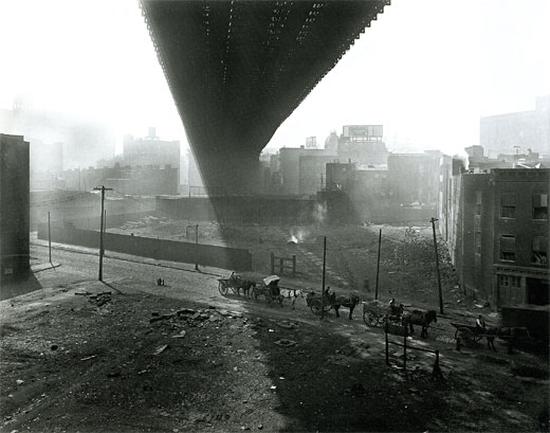
Queens
view looking southwest
November 28, 1910
Eugene de Salignac
_______________________
Three Berlin Essays
Aleš Šteger
translated by Brian Henry
conjunctions
Crack Berlin
When someone’s presence on the street becomes imperceptible as the presence of the street becomes imperceptible in this person. Mommsenstraße, Kastanienallee, Akazienstraße have moved to the shady side, to the side of obvious everyday life, going from admiration of exceptional things to inventory. Within the least expected lurks alienation, which demonstrates that it is only for the illusion of tradition, the illusion, that keeps my attention on a short leash. Sometimes it is enough that some bored dog barks. Midflinch I see at the intersection an excursion bus. A tourist guide with microphone in hand eagerly explains. I cannot hear the words, but I have a feeling I know everything she relates. Facing forward alongside the driver, with a gaze firmly directed through the front pane. This guide is me. Since I left the apartment, this continuous speech is performed in me. I speak and speak, without a dictionary and a map, aimlessly loafing. Only when the bus moves forward do I notice that it’s empty, except for the driver and guide in the bus there is no one the relating would be intended for, no one in this city of three and a half million who would hear what I speak and speak, only my footsteps and my monologue. ...(more)
_______________________

Arshile Gorky
b. April 15, 1904
_______________________
Moon Poem
J.H. Prynne
(....)
Since I must hold to the gradual in
this, as no revolution but a slow change
like the image of snow. The challenge is
not a moral excitement, but the expanse,
the continuing patience
dilating into forms so
much more than compact.
I would probably not even choose to inhabit the
wish as delay: it really is dark and the knowledge
of the unseen is a warmth which spreads into
the level ceremony of diffusion. The quiet
suggests that the act taken
extends so much further, there
is this insurgence of form:
we are more pliant than the mercantile notion
of choice will determine-we go in this way
on and on and the unceasing image of hope
is our place in the world. ...
...(more)
_______________________
Prynne week: Biting the Air
Bebrowed's Blog
(....)
And this is the final three stanzas of the sixth poem:
told to you, root and branch slope management
at onrush unpaired and less compact, generic death
as possession on nil return. Which way the novice
points trail off, they say the same on the block
new level rib, spit your lips. Be quick, be
long to pump anger revivalism, percolate thick
forest scarps dug yet deeper. Get a vaccine on
shipment perish thread your face why yours
if told more, stable on a tilted capital feed
suspected more often. Give out a version amplified
with strings to obligate a boundary check, felt
damp echo ethic manipulate its life exemption.
There’s gloriously complex things that appear to be going on here. Starting with the obvious ‘medical’ words: pharmaceutical, flatline, infirm, generic, rib, lips, vaccine and life exemption- I’m taking this to indicate that the poem is making direct comment on the issues that beset modern medicine rather than using this particular malaise to talk about something else. Of course, he may be doing both but I’m going to stick with medicine as medicine for the moment.
...(more)
_______________________

Little Neck Bridge
Eugene de Salignac
_______________________
Mental Ears and Poetic Work [pdf]
J. H. Prynne
(....)
The poet works with mental ears. Via this specialized audition the real-time sounds of speech and vocalized utterance are disintegrated into sub-lexical acoustic noise by analogy with the striking clatter of real work in the material world. Plus also bird-song, weather sounds, and the cognates. From this first reduction the array of voice-sounds can then be transposed into a textual constellation in which composi- tional purpose begins to remake the anecdotal variety of actual speech. By this means the sociology of utterance-occasions is part-replaced by the textuality of a language domain.^ All human speech performance operates by hybridizing the components of possible word narratives; but the textual domain is an intermediary condition very specific to poetic work."* This domain is constructed from the realized human sounds of words in voluble sequence, utterance as carried through to expression by the apportionment of phrase and sentence and the paragraph or strophic boundaries of their profession, the mental span of serial completions.' Written discourse projects into a representa- tional text-composure the altered acoustics of speech events, real and conjectural. But the discourse of poetry installs a variable set of yet further dimensions.
(....)
_______________________
Jeremy Prynne lectures on Maximus IV, V, VI 1 2
Simon Fraser University, July 27, 1971
Transcribed by Tom McGauley
An Introduction to the Poetry of J.H.Prynne
by Rod Mengham and John Kinsella
jacket
J. H. Prynne's POEMS
The Right to be Unidentified with This Work
Forrest Gander
"Scheming for the possible world":
J.H. Prynne's The White Stones and The English Intelligencer
Alex Latter
_______________________
Reactualising the Unfigurable:
Difficulty and Resistance in Translating J. H. Prynne
Xie Ming
Abstract
This paper explores aspects of translating J. H. Prynne's poetry into Chinese in relation to notions of difficulty and resistance. Through juxtaposing two poems by Prynne and the Tang Dynasty poet Du Fu, the paper argues that translating Prynne alerts the reader-translator to the very nature of poetic figuration. Poetic writing and translating have to do with (re)imagining the actual as contingent possibilities of the real, which is in principle not fully accessible or figurable. The in-betweenness of the two languages in translation constitutes an outside to both. The relative autonomy of this non-place encourages intercultural translation as a potentialisation of the actual.
_______________________
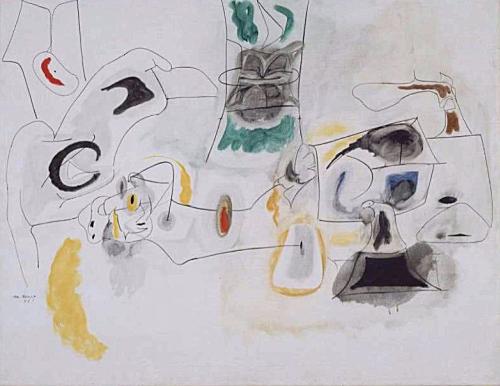
Good Hope Road
Arshile Gorky
_______________________
We Are All Very Anxious
Theses on Anxiety and Why It is Effectively Preventing Militancy, and One Possible Strategy for Overcoming It
Reposted with the kind permission of the Institute for Precarious Consciousness
sometimes explode
libcom.org
.....................................................
Precarity is a machine for anxiety; austerity is a machine for making-vulnerable; psychopathology is the machinery of alienation.
The nervousness of politicssometimes explode
(....)
The article links anxiety to precarity, correctly pointing out that anxiety is the obvious affective response to a systemic uncertainty and fears that lack concrete objects. It also links it to securitisation, but I think we should also link it to the related militarisation of urban spaces and, beyond that, to the climate of catastrophe in which we live. There are how many impending disasters on the horizon? Not one we can respond to as bodies that experience a collective threat as individual.
(....)
I've written about TMT (Terror Management Theory) elsewhere and I intend to return to it on here, as I think it is invaluable to understanding our ontological vulnerability and to the development of an anarchist theory of psychology. Consider what the TMT researchers found in the wake of 9/11, a moment of "mortality salience" and death anxiety on a cultural and national scale. In response to the greatest trauma on the American psyche in recent history the response was an increase in a fervent nationalism, increased intolerance of dissent, more hostility and violence towards people who are different, a desire for revenge and a need to find heroes (whether they be American soldiers going out for revenege, or the firefighters at the scene of the devastation), as well as a desire to help in the cause. In a chapter for a (hopefully) forthcoming book I've written on how capital and governments like to expose us to anxiogenic conditions, to expose us to our vulnerability, in order to illicit precisely these effects. This is the necropolitical side of biopolitics and to my mind it is this that current strategies of the decomposition of labour aim at: the capture, intensification and even production of anxiety.
(....)
A popular unconscious admission today: keep calm and carry on. Keep calm: This is how the open secret of anxiety, of nerves, and the injunction to destimulate is expressed today. Even our despair is sold back to us; even the recovery of our nervous systems. Carry on: stay in the holding pattern of your safety behaviours, don't go too far, don't go astray. The denial of anxiety and the denial of communism displaced and compressed into one compact knotted slogan.At the moment I'm working with others to create an online space for a new militant mental health movement, and to set up something similar to the Institute for Precarious Consciousness. ...(more)
_______________________
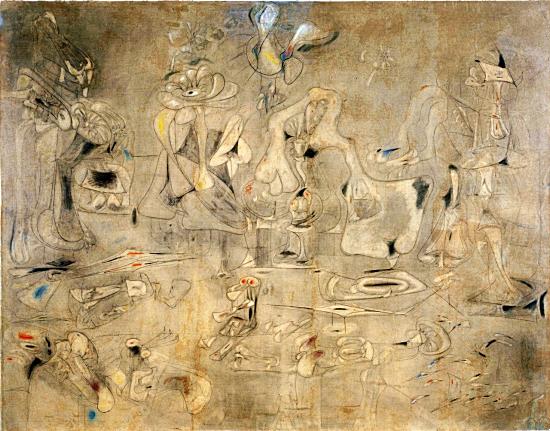
Summation
1947
Arshile Gorky
_______________________
Anarchism’s Other Scene: Materializing the Ideal and Idealizing the Material
Duane Rousselle, Jason Adams
Ontological Anarché: Beyond Materialism and Idealism
Anarchist Developments in Cultural Studies
No 2 (2013)
“The Tuesday scowls, the Wednesday growls, the Thursday curses, the Friday howls, the Saturday snores, the Sunday yawns, the Monday morns, the Monday morns. The whacks, the moans, the cracks, the groans, the welts, the squeaks, the belts, the shrieks, the pricks, the prayers, the kicks, the tears, the skelps, and the yelps.”
- Samuel Beckett, Waiting for Godot
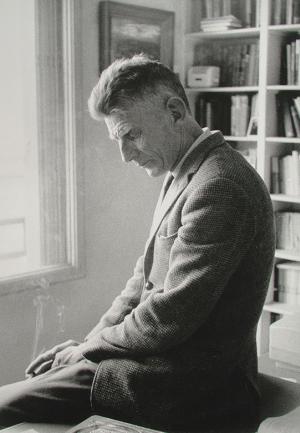
Samuel Beckett
b. April 13, 1906
Paris, 1964
Gisèle Freund
“Unfortunately I am afraid, as always, of going on. For to go on means going from here, means finding me, losing me, vanishing and beginning again, a stranger first, then little by little the same as always, in another place, where I shall say I have always been, of which I shall know nothing, being incapable of seeing, moving, thinking, speaking, but of which little by little, in spite of these handicaps, I shall begin to know something, just enough for it to turn out to be the same place as always, the same which seems made for me and does not want me, which I seem to want and do not want, take your choice, which spews me out or swallows me up, I’ll never know, which is perhaps merely the inside of my distant skull where once I wandered, now am fixed, lost for tininess, or straining against the walls, with my head, my hands, my feet, my back, and ever murmuring my old stories, my old story, as if it were the first time.”
-
Samuel Beckett, The Unnamable
_______________________

Robert Delaunay
b. April 12, 1885
_______________________
Levi R. Bryant: First Impressions on Onto-Cartography
Craig Hickman
noir realism
(....)
Realizing that the basic stuff of reality impacts not only our relations but all relations human or inhuman he opened his materialist eyes toward new ways of relating things. Over the years Levi has used several sliding terms to describe what things are, what the basic stuff of materialism is. But he was never truly satisfied so he came to the conclusion that he’d get out of the business of naming this object and leave our actual understanding of the basic units of matter to the appropriate domain of knowledge: science, and physics in particular. Instead he would deal with both the corporeal and incorporeal modes or forms within which matter structured or coupled itself. This is where his notions of machines comes in. He incorporates Ian Bogost’s notions of an alien phenomenology in which machines engage and interact with each other and ecologies within a milieu, and environment. There is not just one type of machine but a myriad, and because of this machines exist at different levels of reality and have an ontology that both constrains and affords these machines certain paths of possible interaction or movement. Because of this machine ontology is best understood as discovering the different ways these machines not only interact coupling and decoupling with each other, but also describing their operations, their input/outputs of flows of information, matter, and material incorporated within their activities.
The major thrust of his work is to provide a mapping (Onto-Cartography) of these machine assemblages or ecologies across a spectrum of geophilosophical notions: cartography, deconstruction, and terraformation. Under cartography he provides four distinct types of map: cartographical maps, genetic maps, vector maps, and modal maps. Under deconstruction he offers traditional reading with an emphasis on the politics of oppression. And, under terraformation he offers a vision of worlds or ecologies or heterotopias: “alternatives that would allow people to escape the oppressive circumstances in which they live”.
...(more)
Onto-Cartography: An Ontology of Machines and MediaLevi R. Bryant Edinburgh University Press
For a Renewal of
Materialism [pdf] Introduction to Onto-Cartography
The Gravity of Things: [pdf]
An Introduction
To Onto-Cartography
Levi R. Bryant
_______________________

Peculiar insects
1888
James Ensor
b. April 13, 1860
_______________________
Climate change and post-politics: [pdf]
Repoliticizing the present by imagining the future?
Anneleen Kenis and Erik Mathijs
...to create a space for imagining alternative futures, one must first fight post-political representations of the present. However, when politicization becomes an end in itself, the outreach of the movement, and therefore its capacity to repoliticize and stimulate the imagination of alternative futures, is constrained.
Climate Crisis, Ideology, and Collective Action [pdf] Ted Stolze
... given the imminent prospect of severe climate disruption, why
as yet has there occurred relatively little collective action in response?
Psychologist Daniel Gilbert thought he had the answer. In an opinion
piece provocatively titled “If Only Gay Sex Caused Global Warming”
Gilbert argued
that the real psychological obstacle to effective action on
climate change is that human brains have evolved to deal most effectively
with threats that:
• are intentional and personal;
• violate our moral sensibilities;
• are a clear and present danger; and
• involve quick changes rather than gradual changes Unfortunately, as Greg Craven has noted, climate change has none
of these properties; “[i]t is impersonal, morally neutral, in the future, and
gradual, and we’re just not wired to watch out for stuff like that.”
_______________________
Call climate change what it is: violence
Rebecca Solnit
If you're poor, the only way you're likely to injure someone is the old traditional way: artisanal violence, we could call it – by hands, by knife, by club, or maybe modern hands-on violence, by gun or by car.
But if you're tremendously wealthy, you can practice industrial-scale violence without any manual labor on your own part. You can, say, build a sweatshop factory that will collapse in Bangladesh and kill more people than any hands-on mass murderer ever did, or you can calculate risk and benefit about putting poisons or unsafe machines into the world, as manufacturers do every day. If you're the leader of a country, you can declare war and kill by the hundreds of thousands or millions. And the nuclear superpowers – the US and Russia – still hold the option of destroying quite a lot of life on Earth.
So do the carbon barons. But when we talk about violence, we almost always talk about violence from below, not above.
(....)
... if we want to talk about violence and climate change – and we are talking about it, after last week's horrifying report from the world's top climate scientists – then let's talk about climate change as violence. Rather than worrying about whether ordinary human beings will react turbulently to the destruction of the very means of their survival, let's worry about that destruction – and their survival. Of course water failure, crop failure, flooding and more will lead to mass migration and climate refugees – they already have – and this will lead to conflict. Those conflicts are being set in motion now.
...(more)
_______________________
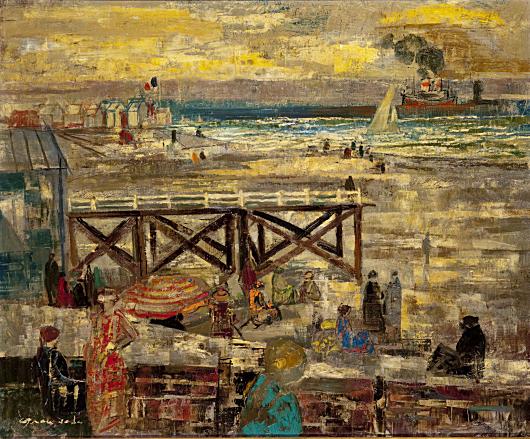
The Beach of Le Havre
1963
Emilio Grau Sala
(1911-1975)
_______________________
(....)There was something more than a principle I abandoned, when I abandoned the equal distribution, it was a bodily need. But to suck the stones in the way I have described, not haphazard, but with method, was also I think a bodily need. Here then were two incompatible bodily needs, at loggerheads. Such things happen. But deep down I didn't give a tinker's curse about being off my balance, dragged to the right hand and the left, backwards and forewards. And deep down it was all the same to me whether I sucked a different stone each time or always the same stone, until the end of time. For they all tasted exactly the same. And if I had collected sixteen, it was not in order to ballast myself in such and such a way, or to suck them turn about, but simply to have a little store, so as never to be without. But deep down I didn't give a fiddler's curse about being without, when they were all gone they would be all gone, I wouldn't be any the worse off, or hardly any. And the solution to which I rallied in the end was to throw away all the stones but one, which I kept now in one pocket, now in another, and which of course I soon lost, or threw away, or gave away, or swallowed ...
-
Molloy sucking-stones

photo - mw
_______________________
Tunneling through the self
On Hoa Nguyen's 'As Long as Trees Last'
Christopher Kondrich
Living with As Long as Trees Last, Hoa Nguyen’s latest collection of poetry, is akin to living with Charles Olson — his endless exuberance, wide-ranging curiosity, and aesthetic agility, as well as his famous invocation of the body as a tunnel through which one must go to know more truly the self and the world around it. “Down through the workings of [the poet’s] own throat to that place where breath comes from,” he writes in Projective Verse, is the path to becoming “participant in the larger force.”
Living with As Long as Trees Last is also akin to living with John Cage — the attention to silence, to the music of reality, to the harmonies and disharmonies that make a life. I think of the presence evoked by his work, of being present to the world, bringing one’s instruments to the stage of the world and allowing the world to play.
Olson and Cage are present in As Long as Trees Last on every page, egging on Nguyen from behind the stage, giving her the theoretical foundation upon which she builds and builds and builds her own vision, one marked by the harmonies and disharmonies of language, thought, and feeling that she reached down into herself to get. The discordant bells of jagged syntax and juxtaposed imagery ring often in the book, discordant in the way a life is lived with anxiety and ferocity, but these bells that ring discordantly also ring true. They ring true in the way Cage’s work rings those everyday sounds, allowing presence and attunement to the oft-neglected disharmonies of reality, but with Olson’s exuberance and his boundless will to break the self off into pieces of the outside world.
...(more)
some poems by Hoa Nguyen
1 2 3
Hoa Nguyen’s “As Long As Trees Last”reviewed by Dana Drori lemon hound
Hoa Nguyen on remaining inside mysteries and the alien alphabets of dreamsbomb
A conversation with Hoa Nguyen part 1 and 2Reb Livingston
As Long As Trees Last By Hoa Nguyen
Reviewed by Dan Shewan
_______________________

John Nash
b. April 11, 1893
_______________________
“Escaping melancholia is as unnatural as fasting or chastity. It is Culture along with the powers that be who have convinced us that smiling, which, as everyone knows, not only feels but also looks unnatural, is the face’s most positive expression. Chasing Culture’s promise of Happiness—a mirage, at best—is as ludicrous and destined to failure as those imbecile rodents who follow each other off a cliff.”
"Unhappiness, Guanajuato" Pablo Piñero Stillmann Electric Literature
As much as it might seem incredible to someone like you or I, happiness, wait, Happiness, hasn’t always had a positive connotation for everyone. This will be easier to accept if you consider that no one thing has been anything, always, for everyone. Most things have been many things for at least some people. Nothing has at times meant Everything and at others meant Some Things. For long stretches of time Nothing actually meant nothing. But I must stop myself because I have the tendency to spin uncontrollably into spirals of confusion and—sometimes—complete nonsense.
...(more)
_______________________
Democracy
Jean-Marie Gleize
Translated from the French by Joshua Clover.
jacket2
(....)
For those who persist “like” Rimbaud, after the flood, in the hive-chaos of big cities, modern industrial and postindustrial societies, those of the western “democratic” empire, the leading sentiment remains that results from the fact that democracy signifies for the moment capitalism, the regime of liberty and liberalism (work, finance, exploitation, profit) — and this democratic capitalism, the polluted air which we breathe, moreover appears as the ultimate and definitive, and for that matter “natural,” form of social life. There is, there will have been, no alternative. Thus the necessity to qualify, to specify: parliamentary, or rather, today, mediatic-parliamentary, democracy, liberal democracy, but also, because quotation marks are there if we try to retrieve, that is to say reappropriate, the word and the thing, “true democracy,” as Marx said, or “wild democracy,” or “radical democracy,” or “insurgent democracy” (as Miguel Abensour suggested, democracy in a permanent state of emergence and constructive critique), or even “democracy without limits” as proposed by Rosa Luxemburg in opposition to “bourgeois democracy.” She subjected “democracy” under quotation marks to an examination of limits and internal contradictions wherein she observed, as did Rimbaud, two closely linked antidemocratic dimensions: militarism and colonialism, the importance of the military apparatus being linked on the one hand to the containment and repression of popular insurrectionary movements, and on the other hand to imposing on the colonized by force of arms the benefits of western economic exploitation and domination.
Thus there is for those, among whom I am one, who continue to read and write within that which we name poetry (that is to say, who situate themselves marginally within the practice of literature itself grown culturally secondary and minor), essentially the consciousness of not being much in phase with democracy as ambient value, as political ideology and as form of government, the feeling of being in no regard represented by the professional politicians and others who themselves are manipulated and ventriloquized by the holds of real power (that of the globalized economy), and with an insuperable sense of paralysis or choking powerlessness. The words slide around, it is enough just to listen. ...(more)
_______________________
video from The Pacific Centre for Technology and Culture
Wendy Brown, Governmentality in the Age of Neoliberalism
Wendy Brown and Arthur Kroker: A Conversation
Vanishing Surveillance: Securityscapes and Ambient Government
David Murakami Wood
_______________________

Frontispiece for the Book of the Tree
John Nash
1927
_______________________
“You won’t recognize Canada when I’m through with it.”
-
Stephen Harper
What Happened to Canada?Marianne Lenabat n+1
(....)
These are not changes born in the hearts and minds of the Canadian people, but an agenda designed and implemented from above, articulated in an imported conservative ideology, to abet the interests of private industry. Some of that agenda, like the shocking attack on Canada’s environmental research community, has been implemented so swiftly and unilaterally that the public is just now catching up. Other aspects, like the undermining of the country’s universal health care system, have been imposed more gradually, a death by a thousand cuts combined with a relentless propaganda campaign.
What is happening in Canada is part of a much larger trend: the formidable disciplinary forces of late capitalism are exerting themselves everywhere, including in other western democracies, where governments are scaling back social programs while lavishing tax concessions and subsidies on industry. The European Union and the United States are similarly absorbing market shocks on behalf of business while allowing downturns to undermine the poor and working class. If Canada is becoming indulgent of, even slavish toward, its resource industry (the biggest contributor to GDP), it is arguably no more so than the United States in relation to its banking sector, which was never brought to heel despite causing the 2008 collapse.
Still, the drastic turn in Canadian politics and policy raises some urgent questions. Why hasn’t the population stopped the attack on its public services? Why have left-leaning parties lost ground at the polls while Harper and his ilk continue getting reelected? Why, in a society with a more collectively oriented spirit, has the political discourse taken a sharp turn to the right?
...(more)
via empty bottle_______________________
Voter Suppression in Canada
Murray Dobbin
_______________________

John Nash
_______________________
Kant, Nietzsche and the idealization of friendship into nihilism
Paul van Tongeren
Kriterion vol.54 no.128
Abstract
Is friendship still possible under nihilistic conditions? Kant and Nietzsche are important stages in the history of the idealization of friendship, which leads inevitably to the problem of nihilism. Nietzsche himself claims on the one hand that only something like friendship can save us in our nihilistic condition, but on the other hand that precisely friendship has been unmasked and become impossible by these very conditions. It seems we are struck in the nihilistic paradox of not being allowed to believe in the possibility of what we cannot do without. Literary imagination since the 19th century seems to make us even more skeptical. Maybe Beckett provides an illustration of a way out that fits well to Nietzsche's claim that only "the most moderate, those who do not require any extreme articles of faith" will be able to cope with nihilism.
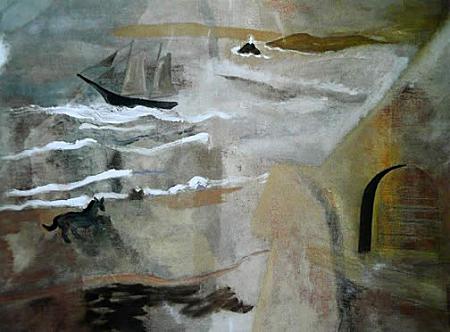
Pothmeor Beach
1928
Ben Nicholson
1894 - 1982
_______________________
Book of Wander
W. G. Sebald's unsystematic search
Damion Searls
bookforum
(....)
Reading these novels and his first to be translated into English, The Emigrants, was a high point in many people’s cultural life. If you’re someone who hears the tones of W. G. Sebald’s voice at all, it is hard to keep from coming hopelessly under its sway. His quivering sensitivity and thoughtful melancholy seemed to express, like nothing else, what life at the end of the twentieth century meant for anyone aware of the holocausts underlying the various triumphalisms one was expected to get on board with. Not everyone can eagerly turn their face away from the devastating past and toward the super-duper future, and for those of us who couldn’t, Sebald offered irresistible arias of historical aftermath. (A math is a mowing, so aftermath encodes a specific image, which Sebald used, of sheaves laid low, scythed down in the field. It used to be a positive word, referring to a second harvest the same season—not anymore.)
(....)
... Sebald never just found connections or followed links; he made them, made them new. Sebald’s work is not encyclopedic, because it lacks any drive for totality or pretense of completeness—he follows whim, goes wherever things take him. In an interview, Sebald described his process this way:
It’s a form of unsystematic searching. . . . One thing takes you to another, and you make something out of these haphazardly assembled materials. And, as they have been assembled in this random fashion, you have to strain your imagination in order to create a connection between the two things. If you look for things that are like the things that you have looked for before, then, obviously, they’ll connect up. But they’ll only connect up in an obvious sort of way, which actually isn’t, in terms of writing something new, very productive.
The poet and translator Anne Carson once said something similar: “The things you think of to link are not in your own control. It’s just who you are, bumping into the world. But how you link them is what shows the nature of your mind.” Unsystematic searching, idiosyncratic linking: These are valuable as ever but harder to get to now, swamped as they are by the other kind. To the challenge of making imaginative connections has been added the challenge of making them visibly our own, off the preprogrammed, data-mined, hyperlinked grid.
...(more)
_______________________

St Ives
Ben Nicholson
1943-5
_______________________
Ditch
Melanie Siebert
the walrus
Strange how we go on looking in the lessening
light, along the highway, looking for the things thieves pitched
from the smashed windows of our van as they drove and rifled through:
maps, gospel cassettes, ball gloves, receipts and sermon notes,
sleeping bag and candles scattered over miles, deemed
worthless, the ditches deep with grass, unmown. We’re steeped
in the overrun, the laid low, the pooled and going nowhere,
in the tremolo of early evening, mint-tinged,
damp to the knees, even weeds and beer cans gleam
as if belonging here: we are intent, walking
without speaking, bending to gather each thing
as if it had a broken wing, might have flown but landed
wounded in the tall grass, beating. Strange how we go on
as if things matter, as if this were a place
where something essential could be found.
Cars blow by. A whistling cowbird bends
a tattered reed. We follow the light-licked
papers sailing above the grass, the field encroaching,
last winter’s road-salt leaching down.
The Walrus
Deepwater VeeMelanie Siebert McClelland
Deepwater Vee reviewed by rob mclennan
_______________________

Ben Nicholson
_______________________
One + One = Zero – Vanishing Text in Electronic Literature
Marjorie C. Luesebrink
electronic book reviewe
abstract
In “One + One = Zero,” Marjorie C. Luesebrink discusses “fleeting” messages and their implications for electronic literature. Beginning with a discussion of the popular social media app, Snapchat, Luesebrink considers a series of works of electronic literature that employ tropes of vanishing and inaccessibility to represent forgetfulness, limited perception, and the challenges posed by dynamic environments for contemporary readers. After tracing a path through two decades of digital practice, Luesebrink points to a future in which the vanishing text will continue to be a relevant site for literary innovation.
.....................................................
E-Literary Text in the Nomadic Cockpit
Janez Strehovec
electronic book review
abstract
In this essay, Janez Strehovec explores the literary from the “nomadic cockpit” everyday life in the 21st Century. More than merely being cocooned by screens, Strehovec’s metaphor describes the way in which our travel through the environment is layered with navigational data, environmental surveillance, communication systems, and tied into a dynamic feedback loop. From this vantage point, Strehovec considers a number of works of digital art and electronic literature that are written precisely to be read in motion, to explore the sensations of life in the nomadic cockpit. _______________________
The Internet’s Endless Argument and the New Shape of Debate
Navneet Alang
hazlitt
... as I watch the kinds of people who seem forced to endure arguments with others—namely, women, people of colour, and other activists—I get the sense that the rules of rhetoric laid down by folk like Aristotle are especially unsuited to Twitter. More interestingly, though, maybe watching people on Twitter invent new rhetorical tactics suggests that what’s wrong with online discourse isn’t that it is hampered by constraint, but that there isn’t enough of it.
After all, if you had to characterize Internet debate in one word, it would be “endless.” Free of the limits of time, space, and the need to look someone else in the eye, Internet argumentation has no natural stopping point, instead only ending when someone finally cries uncle. That unlimited space often gives rise to a kind of debate that works through attrition of attention and energy. “Here, let me ceaselessly argue and nitpick not only the topic at hand,” says the Internet debater, “but also every step of how you arrived at your position.” It’s a kind of hyper-ad hominem that, especially when you’ve been doing it for a few years, can make arguing online feel like an exercise in futility.
As a result, it’s hard not to get the feeling that the application of pre-Internet rhetoric—the sort espoused by our Greek friend himself—simply doesn’t work well within a medium without limits. ...(more)
_______________________

Ben Nicholson
_______________________
Thereafter
by Melanie Siebert
Winner of Lemon Hound's First Poetry Prize
Thereafter the northern plains would be cattle country.
I had paid off my younger self speaking of the highly contaminated water.
The dust was slaloming through the postmodern footnotes.
The sandhill cranes etc had refused treatment.
...(more)
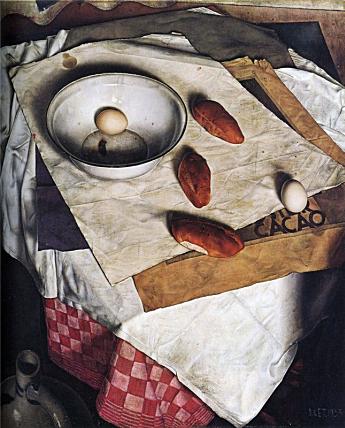
Dick Ket
1902 - 1940
_______________________
The light of this
An itinerant essay around a reading of 'The Gorgeous Nothings'
Linda Russo
jacket2
(....)December 21, Emily Dickinson’s room: I did look at the shadow of my legs spanning the corner of the floor and the north wall. I did look at the yellowed wall and the contrasting white infill of the room’s original arched doorway. I did look right down at the dull and scratched floorboards of various widths of an uneven dusty brown and notice an ochre patch and look right down into the cracks between them. I did look at a similar ochre patch on the wall. I did look closely at the molding around one window marked with strips of blue tape bearing an evocative shorthand marking layers of this archaeological site: “GHOST starts after brown” “pre-55 — no brown” “very early — ochre + red” “patch = post-Emily.”
(....)
In the facsimiles in The Gorgeous Nothings we are invited to face the “shining physiognomy of her work” (Werner, “Their period”), to go further into the peculiarly shaped planes she invented from the options her world put before her. In its shapes we are invited to think about the quickness and mobility — transience, Werner would say — of her writing, fit around the curve of an envelope flap, tucked in a “pocket archive”] (as New York Times reviewer Holland Cotter adroitly put it) with her two-inch stub of a pencil and pulled out for amendment or revision. If poetic form embodies an encounter with the world at hand, what we may see embodied in her envelope-poem forms is her body, how she used it, travelled with it through sharp moments and long days of writing.
The obstacle to grasping Dickinson is, having arrived too late, possibility foreclosed. Higginson wrote that with the announcement of Dickinson’s poetic genius “came the problem never yet solved, what place ought to be assigned in literature to what is so remarkable, yet so elusive of criticism.” Werner dissolves the “problem” of “place” by setting them in flight, writing beautifully in her essay’s concluding section about their vibrancy, and offering, through the figure of the “liberator” who releases birds to test their homing instincts, an image of our earthbound relation to that flight. The Gorgeous Nothings invites us into a reading of or along “the trajectory of her [Emily Dickinson’s] hand […] to be ‘carried away,’ jolted by language into a still unknown future.” It is an invitation, Werner says, that Dickinson’s editors have refused to take.
“For almost twenty years,” Howe writes in her preface, “few poets and fewer scholars, after seeing the originals, have dared to show us the ways in which what we thought we saw was not really what was there” . Because it presents several ways, The Gorgeous Nothings invites new imaginations to dispel what they thought they saw before. To a life shrouded in mystery (her shadow behind a curtain in the pre-dawn light, love letters, prescriptions for epilepsy), The Gorgeous Nothings propels the evolving image of the poet in late life (nearly fifty-six when she died), what we allow her to be — not the daguerreotype, not the virginal myth, not frustrated lover, not the impossibly tiny desk and chair. The possible “flocks” give us a greater sense of an interior of a creative life, the other side to the image of poems and fascicles filed at rest in a drawer. The lack of an “authoritative” reading frets no one involved in this occasion.
(....)
I do not catch Dickinson in the act of writing, but I now have an image that fuels me. Clearly, this isn’t just about Dickinson anymore. I am not a biographer trying to enter and envision the poet’s life. I prefer the “not seeing” of which Werner speaks because it moves beyond the blur and crisps the imagination of the scene of writing, makes the mind sharp in its own sketches. I am not a Dickinson scholar; I’m merely taking part in the scope of engagement — there is everything to imagine — invited by The Gorgeous Nothings. In their writings, Werner, and Howe before her, have showed me how as we analyze and explain, we imagine. And they’ve led me to this working conclusion: scholarship is important not for the facts it disposes us to or the arguments it makes, but for the way it lets us experience human imagination, selfhood, and connectedness....(more)
_______________________

The Vision
1956
Mauricio Lasansky
_______________________
There are two moments that are important in the history of workers’ struggles. Firstly, the moment when the strike is invented: not only as a reaction but also as a demonstration of rationality and of the integral capacity of the worker. The second moment has to do with moving away from the strike as a way of obtaining an advantage in a conflict towards the strike as a general stop, a way of getting out of the game. The general strike is really the peak of the struggle and a way of moving aside. Inaction precisely being something extracted from the old couples passivity/activity; recreation/leisure. There is something active to inaction, because it allows you to get out of the system. You find this in Stendhal’s novel The Red and the Black, where the protagonist discovers in prison that inaction is a destiny which is both more desirable and more inaccessible for the plebeian than reaching the top of society. -
Interview With Jacques Rancière
_______________________
commute to quarter centuries
Calin-Andrei Mihailescu
exquisite corpse
old canadian taxpaying narcissist pets self in mirror
commute to quarter centuries
leaving behind everything and nothing
you went from your-village providential stench
to the capital fragrance sniffer
that let out: twice twice provincial you now
echoing tongue of echoed babble
that told of old rough times
with Cold War gusto of truth amps
when lost land masked lost time
to fit exile's empty face
what rat race in the maze of time to run
to celebrate the years, to not remember
to stick vampires into th'empire of time
to put on makeup thick as ice
was during the ice age
how global you look this morning my love
_______________________
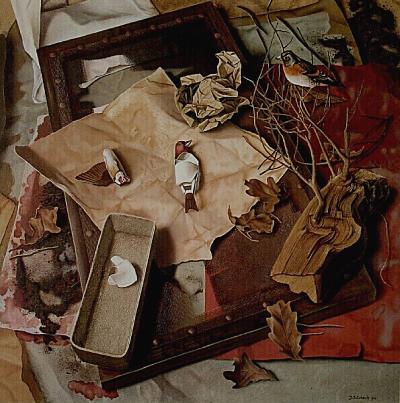
Dick Ket
_______________________
first monday
Volume 19, Number 4 - 7 April 2014
The culture of connectivity: A critical history of social media
José van Dijck
reviewed by Suen de Andrade e Silva
First Monday
Facebook and dramauthentic identity:
A post-Goffmanian theory of identity performance on SNS
D. E. Wittkower
_______________________
Three Stories
Bruce Lawder
conjunctions
The Hunger Wall
The wall is built in the following manner: the poor are assembled and told that the wall is necessary for the nation’s defense and that they therefore are contributing to the defense of the nation. The wall is to be built by hand and thus to have all the benefits of handicraft. The area decreed for the wall is a rocky one, in fact it is hard to imagine why a wall is necessary there, or why anyone would even think of invading such a territory, rocky as it is, but rocky as it is the rocks can be carried by hand or cart to the hill where the wall is to stand. At the end of each day food is distributed to the workers, but only when they are too tired to continue their work. Of course, the wall will never be finished. ...(more)

photo - mw
_______________________
When the Winter Ghosts Depart
Steve Klepetar
They leave slowly, as if reluctant to go
or unsure when the time is right, like travelers
who can’t decide which books to pack, the long
Russian novel they’ve been struggling to finish
or the new one about cerebral werewolves, its firm hard binding
bright on the shelf promising a new kind
of death.
Where ice has leeched deep down into soil, they move
slowly, wading through dirt and loosened stones
but where the symphony of roots has bound them
in a coil of growth they hesitate, caught
up in the coming storm of leaf and branch and flower.
Sometimes they slip away
in pairs, lovers
from an old film, long, gray coats and a fedora
slanting out into sullen wind.
...(more)
More poems by Steve Klepetar1 2 3
Interview with Steve Klepetar
_______________________
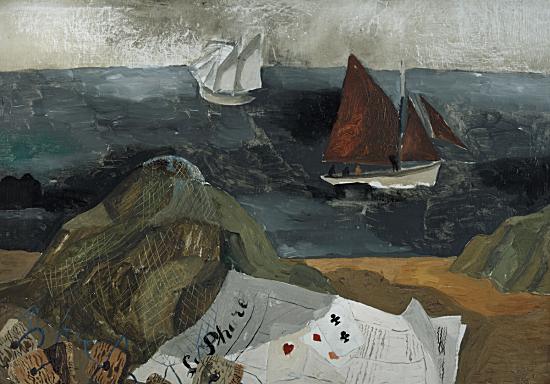
Le Phare
1930
John Christopher Wood
(7 April 1901 – 21 August 1930)
_______________________
II. In the Woods
Jonas Mekas
presented at flowerville
I too, now halfway through my life, entered a dark woods, lost track, saw no more signs, and now have to start all over again, and all I thought, I thought was my real self, drops off just now, so I stand stripped down to basic first things, asking where I am and what I am, straining to hear something in the silence, hearing boundless void inside things, seeing the past keep falling back, feeling that with each new word, urge, sense that I am, I am back at my source, with all my gain and loss, sheer night all around me now I stand here alone.
...(more)
Jonas Mekas
_______________________
A philosophy of everyday things
Steven Connor
Pod Academy
from the transcript
(....)
Brian Dillon: It seems as if, in recent years, and after a couple of decades of academia in general and the humanities in particular being concerned with language – with structures of meaning, whether verbal or based on ideas taken from linguistics, such as reading images through linguistics, all of this going under the broad name of semiotics and structuralism and so on – it seems that after some decades of that the humanities now seem to be obsessed with things, by objects, by something that has become known as ‘thing studies’ [sometimes thing theory, material culture or object studies]. We find this with scholars like Sherry Turkle, who writes on the meaning of contemporary technology, or even popular successors like Neil MacGregor’s A History of the World in 100 Objects, the book based around the British Museum collection. Things seem to be in the air.
Seven Connor: Yes, and I think that’s partly just because we got tired. Ideas just grow old, no matter how true they are, how compelling they are, they just lose their force, we start to get interested in other things. Thank goodness! In my case I’ve become interested … well, I haven’t become interested in things; I’ve just become impatient with pretending that I’m not. It’s not that I’ve become uninterested in all the things that I was schooled to be interested in –signs, codes, information, the ways in which things are also signs and symbols – but there has always seemed so much more that lacked a language. I’ve been interested over quite a long period of time in trying to get out from under that, at perhaps to step aside from that accepted perspective, not because it’s wrong, not because it’s mistaken but just because it’s not complete. I don’t know whether you feel the same thing is involved in other people that are interested in writing about things? Is there some sort of nostalgia or some kind of ‘coming home’ to the way that ‘things’ are?
...(more)
Pod Academy - Podcasts of Current Research
via —synthetic_zero
_______________________

the ege of the sea
Christopher Wood RSW
_______________________
Eight poems
— from special effects
Iain Britton
The Fortnightly Review
*
mnemonics
the gritty mnemonics of a handprint
reveal a life / what life?
because I’m compelled to
i prise open the knotty appendages of undergrowth
that enclose me nightly
*
strangers
my trip takes me through
one door and out the other
the hill in the backyard is
different from the one
growing in the front / nightly
under a dome of glass
i think vast spaces / i hear
a clock / a memory stretching
loose limbs / i think
vast spaces the hubbub of a street
a collision of strangers
more poems by Iain Britton
1 2 3 4
_______________________
A Negative, Pluralist Account of Introspection
Eric Schwitzgebel
(....)
... If I want to know what my visual experience is right now, or my emotional experience, or my auditory imagery, I engage not one cognitive process that was selected or developed primarily for the purpose of acquiring self-knowledge; rather I engage a diversity of processes that were primarily selected or developed for other purposes. I look outward at the world and think about what, given that world, it would make sense for me to be experiencing right now; but also I am attuned to the possibility that I might not be experiencing that, ready to notice clues pointing a different direction. I change and shape my experience in the very act of thinking about it, often (but not always) in a way that improves the match between my experience and my judgment about it. I have memories (short- and long-term), associations, things that it seems more natural and less natural to say, views sometimes important to my self-image about what types of experience I tend to have, either in general or under certain conditions, emotional reactions that color or guide my response, spontaneous speech impulses that I can inhibit or disinhibit. Etc. And any combination of these processes, and others besides, can swirl together to precipitate a judgment about my ongoing stream of experience.
...(more)
Introspection, What?
Eric Schwitzgebel
_______________________
The Production Of Listening
on Biopolitical Sound and the Commonplaces of Aurality
Huw Hallam
Journal of Sonic Studies, volume 2, nr. 1 (May 2012)
_______________________

A Fishing Boat in Dieppe Harbour
Christopher Wood
1929
_______________________
Misery And Debt
On the Logic and History of Surplus Populations and Surplus Capital
co-written by Endnotes and Aaron Benanav
(....)
The coming decades may see a series of blowouts, if states fail to manage global deflationary pressures, or they may see a long and slow decline. While we are not catastrophists by inclination, we would warn against those who might forget that history sometimes rushes forward unpredictably. Regardless, the catastrophe for which we wait is not something of the future, but is merely the continuation of the present along its execrable trend. We have already seen decades of rising poverty and unemployment. Those who say of the still-industrialized countries that it is not so bad, that people will soldier on — in a phrase, that the proletariat has become indifferent to its misery — will have their hypothesis tested in the years to come, as levels of debt subside and household incomes continue their downward trend. In any case, for a huge chunk of the world’s population it has become impossible to deny the abundant evidence of the catastrophe. Any question of the absorption of this surplus humanity has been put to rest. It exists now only to be managed: segregated into prisons, marginalised in ghettos and camps, disciplined by the police, and annihilated by war.
...(more)
Endnotes ... a journal/book series published by a discussion group based in Germany, the UK and the US. The original group was formed in Brighton, UK in 2005 primarily from former participants in the journal Aufheben, after a critical exchange between Aufheben and the French journal Théorie Communiste. But with migration and the addition of new members the group has become increasingly international. Endnotes is primarily oriented towards conceptualising the conditions of possibility of a communist overcoming of the capitalist mode of production—and of the multiple structures of domination which pattern societies characterised by that mode of production—starting from present conditions. As such it has been concerned with debates in “communist theory”, and particularly the problematic of “communisation” which emerged from the post-68 French ultra-left; the question of gender and its abolition; the analysis of contemporary struggles, movements and political economy; the dynamics of surplus population and its effects on capital and class; capitalist formations of “race”; value-form theory and sytematic dialectics; the revolutionary failures and impasses of the 20th Century.
via forgottenness
_______________________
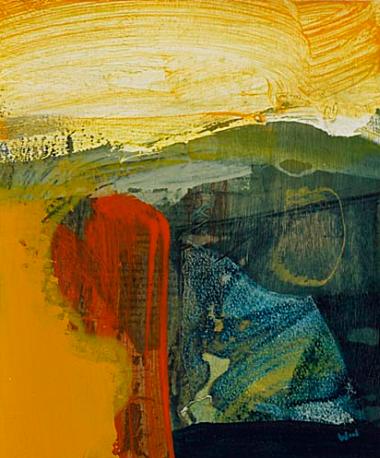
The End of the Day
Christopher Wood RSW
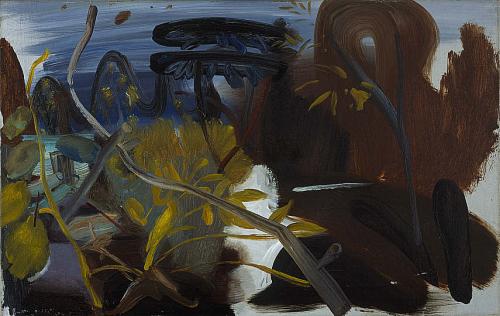
Tangled Pool, No.10
1946
Ivon Hitchens
1893-1979
_______________________
Reflection
Charles Baudelaire
(translated from the French by Jim Powell)
threepenny review
Calm down, heartbreak,
or at least be quiet.
You called on night to fall
and you see, here it is:
an atmosphere of shadows
saturates the city
bringing peace to some
to others worry.
While the abject multitude
of mortal kind
beneath the whip of Pleasure
the Merciless, the tyrant,
goes gathering remorses
at the festival of slaves,
heartbreak, give me your hand,
come this way,
far from these—Look:
the deceased years lean over
the balconies of heaven
in old-fashioned dresses;
out of the waters’ depths
Regret rises, smiling;
the dying sun lies down
to sleep under a bridge
and like a long shroud
trailing to the east
listen, my dear, listen:
gentle Night approaches.
Threepenny Review
Issue 137, Spring 2014
_______________________
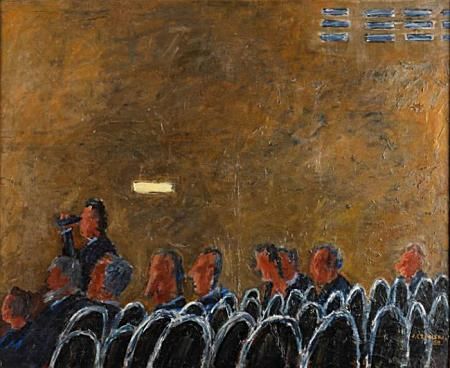
Józef Czapski
b. April 2, 1896
_______________________
John Ashbery, Quick Question
Reviewed by Stephen Ross
(....)
The late poetry is a joyous echo chamber of departing guests, diamond rubble, brewing storms, Americana, doggerel, ad jargon, and… someone should compile a list of all the lists that critics have made to illustrate Ashbery’s wild eclecticism. It would be an Ashbery poem. In the late poetry, things are always blowing up, floating away, crashing down, and encroaching menacingly, yet the damage they cause is never permanent. ‘As though walking on stilts people blew up in amazement / like pieces of trash a wind desultorily lifts,/ then returns for no visible reason’ we read, unfazed, in ‘The Bicameral Eyeball,’ from Quick Question. If we sacrifice variety among Ashbery’s later poems for variety within them, as Stephen Burt argues in his review of Notes from the Air, it must be added that this is because the late work conducts an extended conversation with itself about its own capacity to be born anew. ‘Is it possible that spring could be / once more approaching?’ begins the first poem in Planisphere (2009). ‘Can we begin again?’ asks the last poem in Quick Question.
Michael Robbins casts Ashbery as the ‘Duracell Bunny of American poetry’ in his review of Planisphere, but a more generous critic would observe the simple poignancy of his durability. How wonderful it is to continue reading new poems by him, like ‘Homeless Heart’:
When I think of finishing the work, when I think of the finished work, a great sadness overtakes me, a sadness paradoxically like joy. The circumstances of doing put away, the being of it takes possession like a tenant in a rented house. Where are you now, homeless heart? Caught in a hinge, or secreted behind drywall, like your nameless predecessors now that they have been given names? Best not to dwell on our situation, but to dwell in it is deeply refreshing. Like a sideboard covered with decanters and fruit. As a box kite is to a kite. The inside of stumbling. The way to breath. The caricature on the blackboard.
...(more)
_______________________
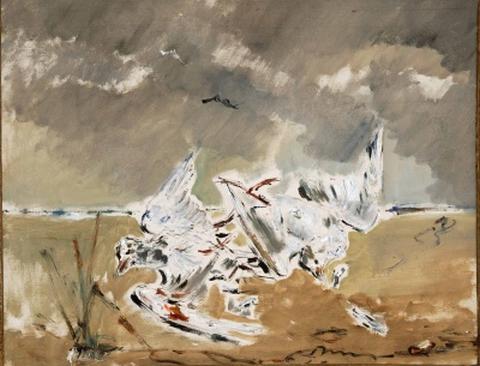
Albatross
1945
Filippo de Pisis
d. April 2, 1956
_______________________
The Pointlessness of Unplugging
Casey N. Cep
... how quickly the digital age turned into the age of technological anxiety, with our beloved devices becoming something to fear, not enjoy. What sex was for the Puritans, technology has become for us. We’ve focussed our collective anxiety on digital excess, and reconnecting with the “real” world around us represents one effort to control it.
And yet the “real” world, like the “real” America, is an insidious idea. It suggests that the selves we are online aren’t authentic, and that the relationships that we forge in digital spaces aren’t meaningful. This is odd, because some of our closest friends and most significant professional connections are people we’ve only ever met on the Internet, and a third of recently married couples met online. It’s odder still because we not only love and socialize online but live and work there, too. Is it any less real when we fall in love and break up over Gchat than when we get fired over e-mail and then find a new job on LinkedIn?
I was struck last year when Pope Benedict XVI, after he started tweeting, delivered a message on social networks. “The exchange of information can become true communication, links ripen into friends, and connections facilitate communion,” the Pope said. He added that, with effort, “it is not only ideas and information that are shared but, ultimately, our very selves.” Perhaps most surprisingly, the Pope argued, “The digital environment is not a parallel or purely virtual world but is part of the daily experience of many people, especially the young.”
In that way, the unplugging movement is the latest incarnation of an ageless effort to escape the everyday, to retreat from the hustle and bustle of life in search of its still core. Like Thoreau ignoring the locomotive that passed by his cabin at Walden Pond or the Anabaptists rejecting electricity, members of the unplugging movement scorn technology in the hope of finding the authenticity and the community that they think it obscures.
...(more)
via Jerz's Literacy Weblog
_______________________

Landscape metaphysical
Filippo de Pisis
1923
_______________________
UbuWeb Top Sixteen
April 2014
Selected by Greg Allen
36 Links From My Life With Ubu
Greg Allen
When Kenny Goldsmith invited me to submit a list, I first tried to come up with some new, revealing, conceptual strategy for generating it. I thought of the top ten most viewed items, and then the ten least viewed. But then I learned that Ubu doesn't keep logs. I thought of the ten largest files, but then figured it'd just be the longest movies, and big whoop. I thought of a top ten list of top ten lists. And when I worried that I would just be mirroring some taste or trend, I thought of identifying the ten items most frequently included in other peoples' lists. Several more ideas were patiently disabused out of me, and I began running through my chance operations options.
Then I realized I'd already begun making my list, starting back in 2002, when I linked to ubu.com from my blog for the first time. Ubu at that point was still quite mysterious, and much smaller--mostly ancient and arcane concrete poetry reprints I frankly hadn't heard of. But I kept coming back. A huge collection of video and audio appeared, Kenneth Goldsmith came out from behind the curtain, seeming much older and august in my mind than he turned out to be--I imagined he was a survivor of this lost underground scene, not an explorer.
Anyway, I assembled my list from twelve years links here at greg.org, highlights from my life with UbuWeb. They're roughly chronological which has become an indispensable collaborator, not just a source of discovery and inspiration.
_______________________
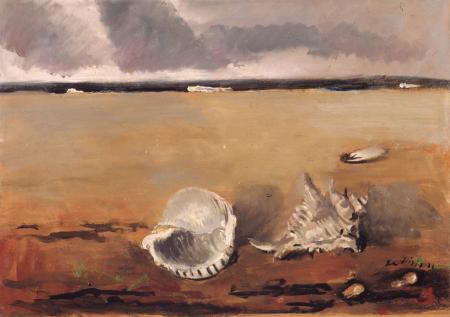
Marine Still Life
Filippo de Pisis
1929
_______________________
Words without Borders
April 2014: Writing from South Korea
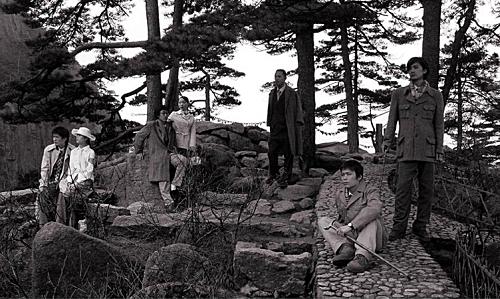
Seven Intellectuals in a Bamboo Forest
still
Yang Fudong
vimeo
_______________________
Foraging for Wood on the Mountain
Jack Gilbert
1925–2012
The wild up here is not creatures, wooded,
tangled wild. It is absence wild.
Barren, empty, stone wild. Worn-away wild.
Only the smell of weeds and hot air.
But a place where differences are clear.
Between the mind’s severity and its harshness.
Between honesty and the failure of belief.
A man said no person is educated who knows
only one language, for he cannot distinguish
between his thought and the English version.
Up here he is translated to a place where it is
possible to discriminate between age and sorrow.
- from The Great Fires: Poems, 1982-1992 by Jack Gilbert
_______________________
Detachment
Michel Serres
Translated from the French by Genevieve James & Raymond Federman
scribd
Trees of Death, The Tree of Life
Trees of Death
I barely dream more than once or twice a year, my nights are dark, my days full of meaning, I only dream in the middle of the day, I dream by trade, laborer, artisan, goldsmith. However one rare night, I did dream I was in a forest, it was, I recall, in India, I was walking amidst gigantic trees and suddenly I found myself in front of an enormous tree trunk. It divided its space in all directions, each branch, each ramification ending with an animal, a lion, a bear or a leopard. That single tree was in itself a forest of tigers, giraffes, pandas and wolves. There were many wild beasts, all very mighty and powerful. Each tree limb sprouted forth to become the backbone of an animal. Each moved a little, while remaining linked, since its body, from the bottom or from the back, identified with the timber of the tree. It was terrifying, hideous like Medusa's head bristling with snakes, the entire hair of this fleshy flaming bush bustled, contorted and growled. Noah's complete Ark as vegetation came out from the earth upon the spine of that trunk. It was terrifying but very gentle. Richness, satisfaction and plenitude emanated from this plant, it overwhelmed me. Even the wild beasts arched their backs. It seems to me I always knew wood was made of flesh, and if branches did bifurcate, flesh had to change its species. This multiple assemblage of regulated madness gave me rapture, a great peaceful rejoicing. I never forgot that tree, that glowing reproductive bouquet of life. That great animal plant is the tree of the species. It is the tree of life, perhaps I found the tree of knowledge.
...(more)
_______________________
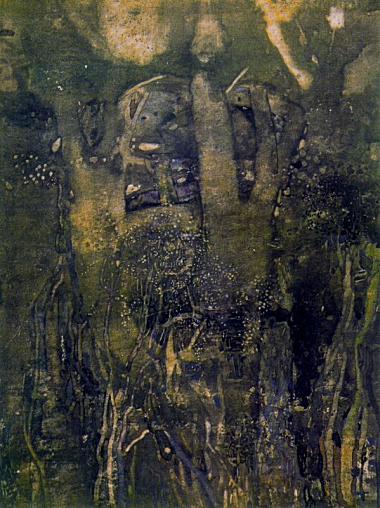
At the Edge of the Wood
1913
Charles Rennie Mackintosh
_______________________
We Are Not From Here
Eugene Thacker looks at Thomas Ligotti'sThe Conspiracy Against the Human Race
Mute
(....)
So then, what kind of book is Conspiracy? It is first and foremost a book about pessimism; but it is also a pessimistic book. While it contains critical insights into the heights and pitfalls of pessimist thinking, it also contains stunning indictments of our many pretentions to being human: ‘As for us humans, we reek of our own sense of being something special’; ‘What is most uncanny about the self is that no one has yet been able to present the least evidence of it.’iConspiracy constantly hovers around that boundary between writing about pessimism and simply writing pessimism, and nowhere is this more evident than in Ligotti's own brand of pessimism, which is at once uncompromising and absurd:
Nature proceeds by blunders; that is its way. It is also ours. So if we have blundered by regarding consciousness as a blunder, why make a fuss over it? Our self-removal from this planet would still be magnificent move, a feat so luminous it would bedim the sun. What do we have to lose? No evil would attend our departure from this world, and the many evils we have known would go extinct along with us. So why put off what would be the most laudable masterstroke of our existence, and the only one?
Different though it is from his previous work, Conspiracy is very much a Ligotti book, both in style and in the ideas it contains. In fact, I would argue that Conspiracy is the logical next step in Ligotti's trajectory as a writer. While the book is ‘philosophical’ in a general sense, in reading Conspiracy one gets the feeling that Ligotti has pushed the boundaries of horror fiction to the limit, where the next step would be to abandon the fictional elements altogether, dispensing with narrative, character, and plot, in favour of the ideas of horror fiction. It is not difficult to see a continuum stretching from the short, abstract mood pieces of Edgar Allan Poe, to Lovecraft's ‘documentary’ approach to horror, to a generation of post-war horror authors such as Ramsey Campbell. Lovecraft himself noted this in his 1927 essay ‘Supernatural Horror in Literature’, where he argues for an understanding of the horror genre in terms of thought – and the limits of thought – more than character, setting, or plot. It is an approach that, as Ligotti notes, characterises nearly all supernatural horror fiction:
...(more)
_______________________

The Illustrious Forger of Dreams
1959
Max Ernst
April 2, 1891 - April 1, 1976
_______________________
The Forgotten Dialect Of The Heart
Jack Gilbert
How astonishing it is that language can almost mean,
and frightening that it does not quite. Love, we say,
God, we say, Rome and Michiko, we write, and the words
get it all wrong. We say bread and it means according
to which nation. French has no word for home,
and we have no word for strict pleasure. A people
in northern India is dying out because their ancient
tongue has no words for endearment. I dream of lost
vocabularies that might express some of what
we no longer can. Maybe the Etruscan texts would
finally explain why the couples on their tombs
are smiling. And maybe not. When the thousands
of mysterious Sumerian tablets were translated,
they seemed to be business records. But what if they
are poems or psalms? My joy is the same as twelve
Ethiopian goats standing silent in the morning light.
O Lord, thou art slabs of salt and ingots of copper,
as grand as ripe barley lithe under the wind's labor.
Her breasts are six white oxen loaded with bolts
of long-fibered Egyptian cotton. My love is a hundred
pitchers of honey. Shiploads of thuya are what
my body wants to say to your body. Giraffes are this
desire in the dark. Perhaps the spiral Minoan script
is not laguage but a map. What we feel most has
no name but amber, archers, cinnamon, horses, and birds.
_______________________

sugar bush
sap lines
photo - mw
|


































